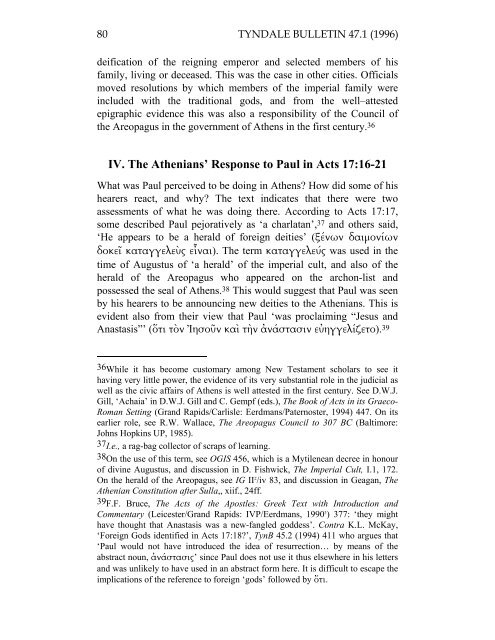on introducing gods to athens: an alternative ... - Tyndale House
on introducing gods to athens: an alternative ... - Tyndale House
on introducing gods to athens: an alternative ... - Tyndale House
You also want an ePaper? Increase the reach of your titles
YUMPU automatically turns print PDFs into web optimized ePapers that Google loves.
80 TYNDALE BULLETIN 47.1 (1996)<br />
deificati<strong>on</strong> of the reigning emperor <strong>an</strong>d selected members of his<br />
family, living or deceased. This was the case in other cities. Officials<br />
moved resoluti<strong>on</strong>s by which members of the imperial family were<br />
included with the traditi<strong>on</strong>al <strong>gods</strong>, <strong>an</strong>d from the well–attested<br />
epigraphic evidence this was also a resp<strong>on</strong>sibility of the Council of<br />
the Areopagus in the government of Athens in the first century. 36<br />
IV. The Atheni<strong>an</strong>s’ Resp<strong>on</strong>se <strong>to</strong> Paul in Acts 17:16-21<br />
What was Paul perceived <strong>to</strong> be doing in Athens? How did some of his<br />
hearers react, <strong>an</strong>d why? The text indicates that there were two<br />
assessments of what he was doing there. According <strong>to</strong> Acts 17:17,<br />
some described Paul pejoratively as ‘a charlat<strong>an</strong>’, 37 <strong>an</strong>d others said,<br />
‘He appears <strong>to</strong> be a herald of foreign deities’ (ξένων δαιμονίων<br />
δοκεῖ καταγγελεὺς εἶναι). The term καταγγελεύς was used in the<br />
time of Augustus of ‘a herald’ of the imperial cult, <strong>an</strong>d also of the<br />
herald of the Areopagus who appeared <strong>on</strong> the arch<strong>on</strong>-list <strong>an</strong>d<br />
possessed the seal of Athens. 38 This would suggest that Paul was seen<br />
by his hearers <strong>to</strong> be <strong>an</strong>nouncing new deities <strong>to</strong> the Atheni<strong>an</strong>s. This is<br />
evident also from their view that Paul ‘was proclaiming “Jesus <strong>an</strong>d<br />
Anastasis”’ (ὅτι τὸν Ἰησοῦν καὶ τὴν ἀνάστασιν εὐηγγελίζετο). 39<br />
36While it has become cus<strong>to</strong>mary am<strong>on</strong>g New Testament scholars <strong>to</strong> see it<br />
having very little power, the evidence of its very subst<strong>an</strong>tial role in the judicial as<br />
well as the civic affairs of Athens is well attested in the first century. See D.W.J.<br />
Gill, ‘Achaia’ in D.W.J. Gill <strong>an</strong>d C. Gempf (eds.), The Book of Acts in its Graeco-<br />
Rom<strong>an</strong> Setting (Gr<strong>an</strong>d Rapids/Carlisle: Eerdm<strong>an</strong>s/Paternoster, 1994) 447. On its<br />
earlier role, see R.W. Wallace, The Areopagus Council <strong>to</strong> 307 BC (Baltimore:<br />
Johns Hopkins UP, 1985).<br />
37I.e., a rag-bag collec<strong>to</strong>r of scraps of learning.<br />
38On the use of this term, see OGIS 456, which is a Mytilene<strong>an</strong> decree in h<strong>on</strong>our<br />
of divine Augustus, <strong>an</strong>d discussi<strong>on</strong> in D. Fishwick, The Imperial Cult, I.1, 172.<br />
On the herald of the Areopagus, see IG II 2 /iv 83, <strong>an</strong>d discussi<strong>on</strong> in Geag<strong>an</strong>, The<br />
Atheni<strong>an</strong> C<strong>on</strong>stituti<strong>on</strong> after Sulla,, xiif., 24ff.<br />
39F.F. Bruce, The Acts of the Apostles: Greek Text with Introducti<strong>on</strong> <strong>an</strong>d<br />
Commentary (Leicester/Gr<strong>an</strong>d Rapids: IVP/Eerdm<strong>an</strong>s, 1990 3 ) 377: ‘they might<br />
have thought that Anastasis was a new-f<strong>an</strong>gled goddess’. C<strong>on</strong>tra K.L. McKay,<br />
‘Foreign Gods identified in Acts 17:18?’, TynB 45.2 (1994) 411 who argues that<br />
‘Paul would not have introduced the idea of resurrecti<strong>on</strong>… by me<strong>an</strong>s of the<br />
abstract noun, ἀνάστασις’ since Paul does not use it thus elsewhere in his letters<br />
<strong>an</strong>d was unlikely <strong>to</strong> have used in <strong>an</strong> abstract form here. It is difficult <strong>to</strong> escape the<br />
implicati<strong>on</strong>s of the reference <strong>to</strong> foreign ‘<strong>gods</strong>’ followed by ὅτι.

















